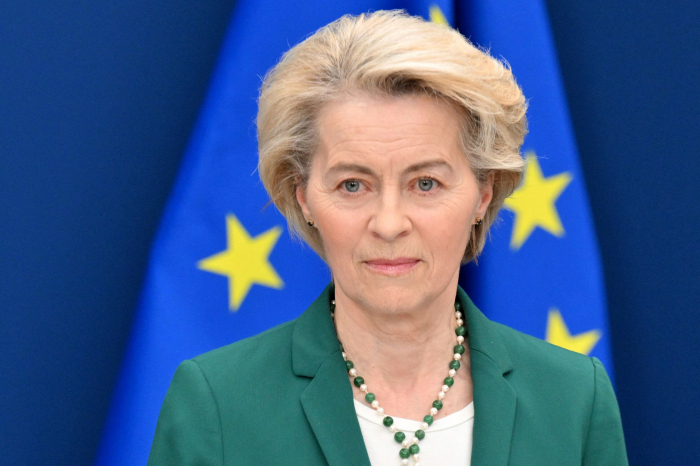The European Union will suspend for 90 days its countermeasures against the U.S. in response to President Donald Trump’s steel and aluminum tariffs, to buy time to negotiate a trade deal, Ursula von der Leyen said Thursday.
The European Commission president announced the concession after Trump pulled a U-turn on Wednesday on the punishing “reciprocal” tariffs he announced on “Liberation Day” just over a week ago.
“We want to give negotiations a chance,” von der Leyen said in a social media post. “While finalising the adoption of the EU countermeasures that saw strong support from our Member States, we will put them on hold for 90 days.”
In a stunning move, Trump on Wednesday halved the 20 percent tariff he announced on the EU on April 2, bringing it into line with a 10 percent universal tariff he has set for most countries. At the same time, he jacked up tariffs on China to 125 percent in an escalating tit-for-tat trade battle between the world’s two largest economies.
The resulting pause was discussed by EU ambassadors in an emergency meeting on Thursday morning, the day after member countries gave their overwhelming assent to counter measures on €21 billion in U.S. exports — ranging from agricultural and industrial commodities to cigarettes, ice cream and even yachts.
The tariffs would still start to be put in place from next week, as initially planned, but they would be suspended by a separate legal proposal to create room for negotiations with the White House, according to four diplomats who were granted anonymity to discuss the closed-door meeting.
Von der Leyen added: “If negotiations are not satisfactory, our countermeasures will kick in. Preparatory work on further countermeasures continues. As I have said before, all options remain on the table.”
Relieving the pressure
Trump’s retreat relieved massive pressure on financial markets, triggering a double-digit rally in stocks and easing strains on the market for U.S. Treasury bonds that had threatened the stability of the global financial system. Still, U.S. tariffs remain higher than they have been in a century.
In a statement Thursday, Chinese foreign ministry spokesperson Lin Jian said: “The U.S. uses tariff as a weapon to exert maximum pressure for its own selfish gains, which severely hurts the legitimate rights and interests of all countries, violates the WTO rules, sabotages the rules-based multilateral trading regime, and destabilizes the global economic order.”
Aftershocks continued to rumble through financial markets on Thursday, as investors tried to absorb the implications of a week of wildly erratic policy-making.
By early afternoon, European stock markets were sharply higher, catching up with the relief rally that U.S. markets enjoyed late on Wednesday. However, U.S. stocks didn’t make any further gains in premarket trading, reflecting the awareness that the big issue of the U.S.’s relationship with China remains unresolved.
In the foreign exchange markets, meanwhile, money continued to flow out of the dollar, in what some saw as a vote of no-confidence in the currency that has dominated global finance for the last century. The euro, yen and Swiss franc all soared, while gold futures rose nearly 2 percent to a new record high.
“The damage has been done,” said Deutsche Bank strategist George Saravelos in a note to clients, warning of “a permanent sense of unpredictability in policy” even if the tariffs are permanently suspended. “The events of the last few weeks will resonate ... for many years to come. The desire to build greater strategic independence from the U.S. across all fronts will be here to stay.”
Politico
More about:















































